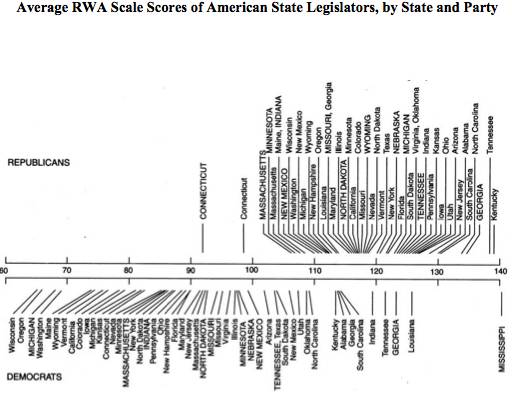It’s about what happened to the American government after "conservatives" gained control of Congress in the 1990s and the White House in 2000. It’s about the disastrous decisions that government made, which have created the enormous problems we face now. It’s about the corruption that rotted the Congress. It’s about how traditional conservatism has nearly been destroyed by authoritarianism. It’s about how the “Religious Right” teamed up with amoral authoritarian leaders to push its un-democratic agenda onto the country.
For example, take the following statement: “Once our government leaders and the authorities condemn the dangerous elements in our society, it will be the duty of every patriotic citizen to help stomp out the rot that is poisoning our country from within.” Sounds like something Hitler would say, right? Want to guess how many politicians, how many lawmakers in the United States agreed with it? Want to guess what they had in common?Altemeyer puts forward a Right-Wing Authoritarian personality scale, with higher scores correlating with the trait. High-RWA individuals have a "Daddy knows best" attitute to the authorities. They defer to their leaders, and even while they often believe that the law, however harsh, must be obeyed, they will exempt their leaders from this if the ends justify the means (such as approving of illegal activities against "radicals" or "enemies of society"). They view the world in terms of in-groups and out-groups, with little sympathy for the latter, and an us-vs.-them outlook, exhibit aggression against those seen to be transgressing against the norms of society, and are quicker than average to join with others to take action against them. And, being highly conventional, they interpret a lot of things as existential threats to the established order. (Authoritarianism, in other words, seems to tie in with a survival-values worldview, driven by the perception of existential threats and the need to deal with them.) Being driven by faith in authority, high-RWAs are more capable than most of compartmentalising contradictory beliefs and resisting challenges to their beliefs posed by logic or evidence.
The Authoritarians looks at the RWA scale and other phenomena, such as religious fundamentalism, social-dominance orientation and real-world politics. Not surprisingly, there are correlations between right-wing authoritarianism and religious fundamentalism, and both are strong predictors of prejudice against out-groups. (Paradoxically, many high-RWA people exhibit both racial prejudices and hostility to overt racism, largely due to not seeing themselves or their peers as racially prejudiced; this would be the dampening effect authoritarianism has on insight and analysis.) Meanwhile, there are both parallels and differences between right-wing authoritarian followers and people who score highly on the social dominance scale; the former don't necessarily want personal power, whereas the latter are less likely to be religious or constrained by rules, though will often happily feign religiosity as a means to an end. Some individuals, of course, score highly on both scales. Because authoritarian followers are receptive to messages that feel right, and are suspicious of critical thought, right-wing authoritarian movements attract more than their share of power-hungry sociopaths willing to pound the right talking points to get willing, unquestioning followers.
The bad news is, the authoritarians have been ascendant over the past decade (in the US, Altemeyer says, they have largely seized the Republican Party). The good news is that right-wing authoritarianism, as a tendency, can be defeated. Studies have found that fear increases RWA scores, in effect making people shut up and follow the leader. (This was used to great effect by the Bush Whitehouse, for example, by instituting a prominent colour-coded terror threat level, seldom dipping below "severe", and raising it inexplicably before elections.) Fearful societies are governed by authoritarian survival values, which have a harder time of getting a grip without fear. Exposure to people unlike oneself and one's "in-group" also weakens authoritarian tendencies, as does a liberal education. A study cited by Altemeyer showed university students' RWA scores declining steadily over the course of their studies, and remaining low throughout their lives. (Parenting, meanwhile, causes one's RWA scores to increase slightly.)
There are other ideas Altemeyer's Right-Wing Authoritarianism scale ties into, such as Lakoff's strict-father/nurturing-parent family dichotomy (which Altemeyer looks at though finds weakly connected), Milgram's obedience experiment, Zimbardo's Stanford Prison Experiment, and theories about the mass psychology of fascism. (Of which this strikes me as one of the more useful ones; while it may be fun to posit connections between fascism and manned flight or the mass spectacle of rock'n'roll, those are probably less useful for actually understanding the threat of fascism as a mass movement.)